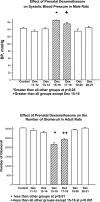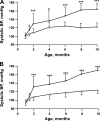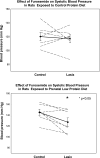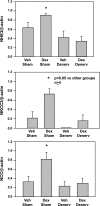Role of the kidney in the prenatal and early postnatal programming of hypertension
- PMID: 19794108
- PMCID: PMC2822514
- DOI: 10.1152/ajprenal.00288.2009
Role of the kidney in the prenatal and early postnatal programming of hypertension
Abstract
Epidemiologic studies from several different populations have demonstrated that prenatal insults, which adversely affect fetal growth, result in an increased incidence of hypertension when the offspring reaches adulthood. It is now becoming evident that low-birth-weight infants are also at increased risk for chronic kidney disease. To determine how prenatal insults result in hypertension and chronic kidney disease, investigators have used animal models that mimic the adverse events that occur in pregnant women, such as dietary protein or total caloric deprivation, uteroplacental insufficiency, and prenatal administration of glucocorticoids. This review examines the role of the kidney in generating and maintaining an increase in blood pressure in these animal models. This review also discusses how early postnatal adverse events may have repercussions in later life. Causes for the increase in blood pressure by perinatal insults are likely multifactorial and involve a reduction in nephron number, dysregulation of the systemic and intrarenal renin-angiotensin system, increased renal sympathetic nerve activity, and increased tubular sodium transport. Understanding the mechanism for the increase in blood pressure and renal injury resulting from prenatal insults may lead to therapies that prevent hypertension and the development of chronic kidney and cardiovascular disease.
Figures






References
-
- Alexander BT. Placental insufficiency leads to development of hypertension in growth-restricted offspring. Hypertension 41: 457–462, 2003 - PubMed
-
- Alexander BT, Hendon AE, Ferril G, Dwyer TM. Renal denervation abolishes hypertension in low-birth-weight offspring from pregnant rats with reduced uterine perfusion. Hypertension 45: 754–758, 2005 - PubMed
-
- Alexander BT, Rinewalt AN, Cockrell KL, Massey MB, Bennett WA, Granger JP. Endothelin type a receptor blockade attenuates the hypertension in response to chronic reductions in uterine perfusion pressure. Hypertension 37: 485–489, 2001 - PubMed
-
- Bailly C, Imbert-Teboul M, Roinel N, Amiel C. Isoproterenol increases Ca, Mg, and NaCl reabsorption in mouse thick ascending limb. Am J Physiol Renal Fluid Electrolyte Physiol 258: F1224–F1231, 1990 - PubMed
Publication types
MeSH terms
Substances
Grants and funding
LinkOut - more resources
Full Text Sources
Medical

